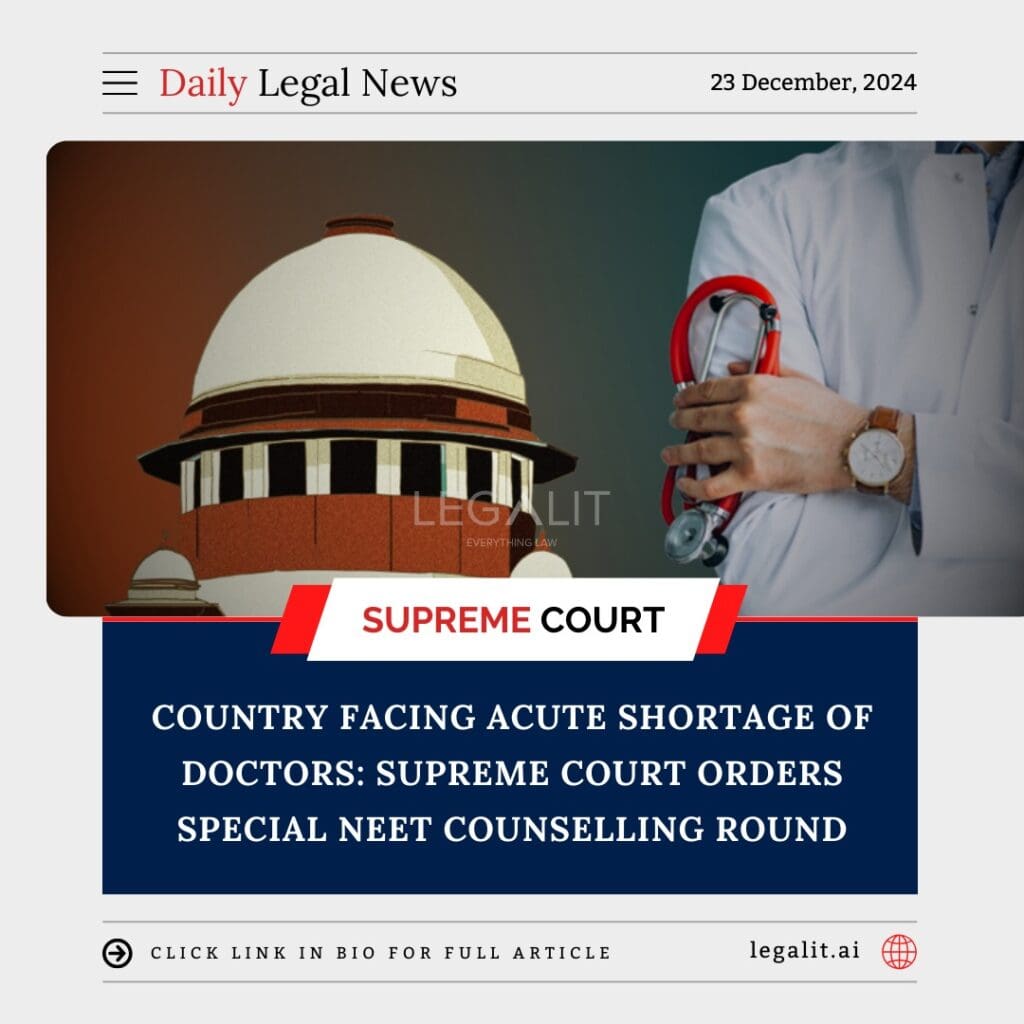
The Supreme Court of India has intervened to address the growing shortage of doctors across the country by directing the government to conduct a special round of NEET (National Eligibility cum Entrance Test) counselling. The move is aimed at ensuring that all vacant medical seats are filled, thereby maximizing the utilization of available resources to bolster the healthcare system. The court expressed its concern over the acute shortage of medical professionals, especially in rural and underserved areas, and emphasized the need for urgent measures to rectify the situation.
Background
India has been grappling with a significant shortage of doctors, with many regions lacking adequate healthcare services. Reports have highlighted that a substantial number of medical seats remain unfilled each year due to procedural inefficiencies in counselling rounds.
A group of petitioners approached the Supreme Court, citing the unallocated seats from the previous NEET counselling sessions. They argued that these vacant seats could have been filled through additional rounds of counselling, which would have helped alleviate the pressing need for medical professionals in the country. The court recognized the gravity of the issue and took suo motu cognizance to ensure that remedial action is taken.
Key Arguments
Petitioners’ Concerns
- Wastage of Medical Seats: The petitioners pointed out that unfilled medical seats represent a missed opportunity to train new doctors, further exacerbating the country’s healthcare challenges.
- Impact on Public Health: They argued that the lack of doctors directly impacts the quality of healthcare services, particularly in remote areas where medical access is already limited.
Government’s Stand
- Efforts to Address Vacancies: The government highlighted its ongoing initiatives to address the shortage, including increasing the number of medical colleges and training programs.
- Challenges in Counselling Process: Officials acknowledged procedural hurdles but assured the court that steps are being taken to streamline the counselling process.
Court’s Observations
- Immediate Action Required: The Supreme Court noted that the shortage of doctors is a critical issue that demands immediate attention. The court observed that filling vacant medical seats through a special counselling round is a practical and necessary step.
- Equity in Healthcare Access: The bench emphasized the need to ensure that all regions, especially rural and underserved areas, benefit from an adequate number of trained medical professionals.
Legal and Policy Implications
Strengthening Healthcare Infrastructure
The court’s directive highlights the importance of a robust healthcare system supported by an adequate workforce. It underscores the need for systemic changes to ensure that medical education and training programs are aligned with the country’s healthcare demands.
Streamlining Counselling Processes
The ruling is expected to push authorities to reevaluate and improve the NEET counselling process. This could involve better coordination between states and central agencies, ensuring transparency and efficiency in seat allocation.
Enhancing Public Health Outcomes
By prioritizing the filling of vacant medical seats, the decision aims to increase the number of practicing doctors, thereby improving healthcare delivery across the country. This aligns with the broader goal of achieving universal healthcare access.
Conclusion
The Supreme Court’s intervention to conduct a special NEET counselling round is a significant step towards addressing the acute shortage of doctors in India. By ensuring that no medical seat goes unfilled, the court has underscored the critical link between medical education and public health. This decision not only seeks to maximize the utilization of existing resources but also serves as a reminder of the urgent need to strengthen the country’s healthcare system. The ruling is expected to have a positive impact on the availability of medical professionals, particularly in underserved areas, ultimately contributing to better health outcomes for the population.